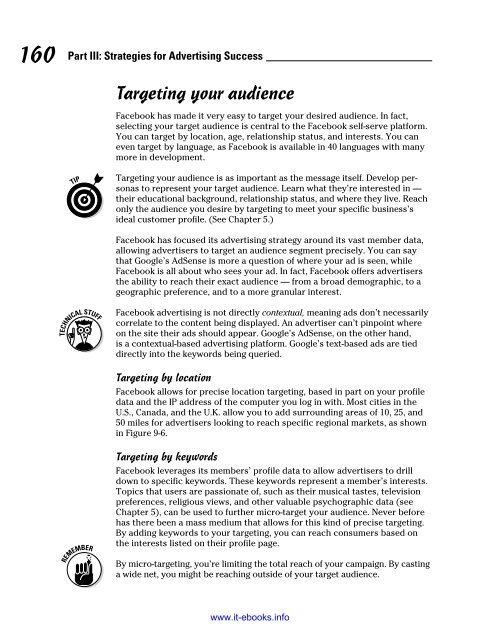facebook_marketing_for_dummies
You also want an ePaper? Increase the reach of your titles
YUMPU automatically turns print PDFs into web optimized ePapers that Google loves.
160<br />
Part III: Strategies <strong>for</strong> Advertising Success<br />
Targeting your audience<br />
Facebook has made it very easy to target your desired audience. In fact,<br />
selecting your target audience is central to the Facebook self-serve plat<strong>for</strong>m.<br />
You can target by location, age, relationship status, and interests. You can<br />
even target by language, as Facebook is available in 40 languages with many<br />
more in development.<br />
Targeting your audience is as important as the message itself. Develop personas<br />
to represent your target audience. Learn what they’re interested in —<br />
their educational background, relationship status, and where they live. Reach<br />
only the audience you desire by targeting to meet your specific business’s<br />
ideal customer profile. (See Chapter 5.)<br />
Facebook has focused its advertising strategy around its vast member data,<br />
allowing advertisers to target an audience segment precisely. You can say<br />
that Google’s AdSense is more a question of where your ad is seen, while<br />
Facebook is all about who sees your ad. In fact, Facebook offers advertisers<br />
the ability to reach their exact audience — from a broad demographic, to a<br />
geographic preference, and to a more granular interest.<br />
Facebook advertising is not directly contextual, meaning ads don’t necessarily<br />
correlate to the content being displayed. An advertiser can’t pinpoint where<br />
on the site their ads should appear. Google’s AdSense, on the other hand,<br />
is a contextual-based advertising plat<strong>for</strong>m. Google’s text-based ads are tied<br />
directly into the keywords being queried.<br />
Targeting by location<br />
Facebook allows <strong>for</strong> precise location targeting, based in part on your profile<br />
data and the IP address of the computer you log in with. Most cities in the<br />
U.S., Canada, and the U.K. allow you to add surrounding areas of 10, 25, and<br />
50 miles <strong>for</strong> advertisers looking to reach specific regional markets, as shown<br />
in Figure 9-6.<br />
Targeting by keywords<br />
Facebook leverages its members’ profile data to allow advertisers to drill<br />
down to specific keywords. These keywords represent a member’s interests.<br />
Topics that users are passionate of, such as their musical tastes, television<br />
preferences, religious views, and other valuable psychographic data (see<br />
Chapter 5), can be used to further micro-target your audience. Never be<strong>for</strong>e<br />
has there been a mass medium that allows <strong>for</strong> this kind of precise targeting.<br />
By adding keywords to your targeting, you can reach consumers based on<br />
the interests listed on their profile page.<br />
By micro-targeting, you’re limiting the total reach of your campaign. By casting<br />
a wide net, you might be reaching outside of your target audience.<br />
www.it-ebooks.info


